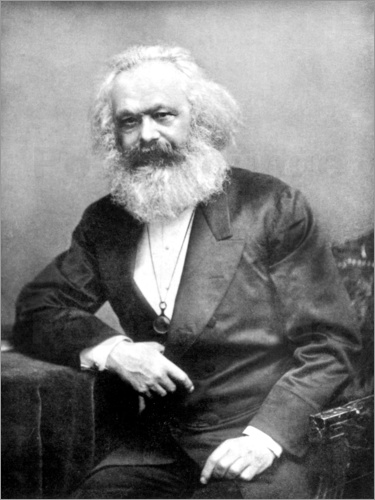
Numerous misinterpretations prevail. This blog attempts to clear up two of these: the environmentalist interpretation, and the ostensibly ‘materialist’ take. No blog of around 800 words could do Marx’s ideas justice – these are a few ideas that are intended to spur debate.
Firstly, the environmentalist interpretation holds that capitalism is destructive to the environment and must be reformed to enable a simpler type of existence that is more harmonious with the desires or interests of the planet. But Marx’s concern is only for human welfare – this depends on a functioning planet, yes, and also some concern for animals is appropriate to the extent they enrich human life. This is Big Anthropocentrism. Capitalism does degrade the environment, even to life-threatening levels as we are beginning to see with the growing frequency of extreme weather events constituting a new trend. And yes, part of the issue is indeed non-human species depletion or extinction. Today Marx would be horrified at the conversion of Africa’s big game into just another resource, or the undermining of the sustainability of coral reefs.
But this is because Marx the humanist is worried about things that concern us, rather than some kind of inherent non-human moral value floating within such entities. The solution to capitalistic environmental degradation is a new human society where our relationship to nature is considerate and rational rather than solely profit-oriented, that doesn’t preclude doing this or that where appropriate. Moreover, with concerted effort, capitalism can sometimes mop up ecological disasters, so the environmentalist critique is non-revolutionary, whereas Marx wanted to transform our whole relationship with nature so as to remove the powerful alienation that prevails under capitalism.
Because Marx wrote so much about economics, and academia has failed to link this to his earlier focus on alienated human relationships, some have claimed that the essential Marx was all about developing the productive forces, go for economic growth whatever the cost. This is erroneous firstly because it silences that most petulant of productive forces – labour. Although Marx clearly thought the good society massively develops machinery and the such, his main concern was on the freedom of the individual worker and their own self-development that capitalism negates. Capitalism reduces the individual member of society to an appendage to the machine and crushes them both mentally and physically. Thus, the emphasis on developing the productive forces is first and fore mostly about liberating labour from the drudgery of profit-driven society.
Secondly there seems to be a semi-conscious attempt to interpret Marx as a vulgar pro-growth materialist in order to let capitalism off the hook – to say that alienated human relationships and their impact on everyone are irrelevant to his overriding concern with fixing or ameliorating the tendency for the rate of profit to fall. Thus, Phil Mullan’s recent book Creative Destruction that I reviewed here takes a very narrow interpretation of the oeuvre only in order to suggest ways capitalism might overcome some current barriers to growth. The role played by the theory of the falling rate of profit in Marx’s overall outlook is totally neglected.
The centrality of the theory of the falling rate of profit in Marxism is the final proof that the bourgeoisie would undoubtedly cease to be a revolutionary force in every country they reign, and that capitalism would have to undermine its own moral and intellectual foundations to persist. In other words, the quality of human life would necessarily deteriorate as long as capitalism persisted, not only in terms of the material standard of living but also in terms of the quality of human relationships in society at large.
Marx’s understanding of the consequences of his theory of the falling rate of profit upon the quality of human existence is borne out by subsequent history. Two world wars later and perhaps a third on the horizon, with only 36 minutes of peace known to the world since the end of World War Two, racism and brutality, the increased role of the state in social affairs, increased homelessness in the ‘advanced’ countries and massive destitution everywhere else, show capitalism has not fulfilled the claim it originally made to be an ‘Enlightenment’ society heading towards a new golden age. The falling rate of profit is not important because we want capitalists to make lots of money – who cares? – but because the consequences of it upon society are dire as the ruling class offer apology after apology and quietly drop the claims to liberty and equality they once made. Nowadays everyone hates everyone else, partly because economic life is so frustrating, and, filtered down, you get the new trend of horrendous school shootings in the USA.
To conclude, Marx was fundamentally opposed to capitalism because he was the most astute and consistent humanist that philosophy has ever produced.